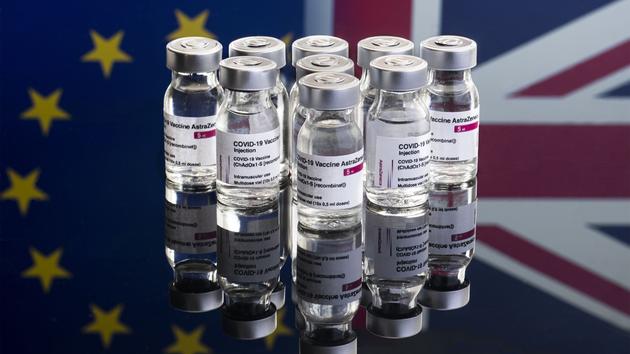Tom Chivers is a science journalist for the Unherd website. Data Specialist, he published
How to read numbers, A guide to statistics in the News,
(How to read the numbers, a guide to statistics in the media).
FIGAROVOX.
- 60% of British people have now received at least one dose of vaccine, compared to 12% in France.
But only 6% of the British population received two doses.
And yet the death rate is plummeting.
Does this mean that the strategy of delaying the second dose was the right one?
If so, why haven't all countries implemented it?
Tom CHIVERS.
-
I cannot tell you why other countries did not do it.
Some have said that the centralized system of the NHS (Editor's note: the name of the British health system) makes it easier to contact patients and their follow-up, so it is easier to space out appointments by 12 weeks.
Additionally, the UK system where patients are contacted directly, rather than being informed that they can now make appointments, means we don't rely on patients to remember to make their second appointment.
Maybe our health care system is one of the reasons, but I suspect it's mostly some sort of nervousness to stray from the seemingly safe path of following manufacturers' instructions.
For example, the European Union has spent a lot of time and effort in ensuring that the laboratories, and not the EU, are responsible for any side effects;
the UK did not care, believing that the time wasted organizing it would cost more than the gains.
I think the UK immunization program has better measured the cost-benefit balance in general.
In society as a whole, you get much better protection if you give as many people as possible a first dose.
But that aside, yes, I think it's absolutely true that the UK's delayed dose strategy is the right one.
A few weeks after the first dose, the average protection is very high - not quite as high as with two doses, but almost and extremely high against severe forms and death.
These are simple calculations: if you have two vaccines and two people, you can either give both doses to one or one dose to each.
Giving both to one means roughly 85% protection for one and 0% for the other, for an average of 42.5%.
Giving both people one dose each means 75% for each, for an average of 75%.
In society as a whole, you get much better protection if you give as many people as possible a first dose.
More generally, what are the reasons for the success of the British vaccine strategy?
I think the first dose strategy is one of them.
But also to understand that the important thing was not the cost of the vaccines, nor the questions of responsibility - these parameters are covered by the gains obtained by procuring as many vaccines as possible.
The UK bought as much as it could, ahead of time, from many different suppliers, not too much concerned with cost or liability or whether any of them would work.
He signed the contracts months and months in advance (three months before the EU) so was at the head of the queue.
He supported research and development.
Keeping indicators simple seems like a good idea: just older age groups, then younger age groups (over 80, over 70, etc.).
The only added brackets are caregivers, EPHAD workers, their residents and a small number of pre-existing conditions.
I imagine that a centralized system, with good knowledge of everyone's state of health and age, also made it easier to keep track of these simple measures.
The system of texting people for their dates, rather than having them book theirs (and crashing websites like they're booking concert tickets), has been helpful.
As well as widespread local vaccination centers so that no one has to travel far.
What is your view on France's strategy to fight the virus?
I am not an expert on the subject.
But I can say three things: 1) The decision to suspend the Astra Zeneca vaccine (France is not the only culprit here) was extremely reckless.
I could understand that the regulators are issuing a statement of concern, but suspending it has caused tremendous harm.
Although it can cause blood clots, they are extremely rare and the damage is more than compensated for by the gain.
2) As mentioned, it would be better to delay the second dose.
3) It doesn't surprise me that France has entered another lockdown now.
I remember Macron deciding not to do this a few weeks ago, and Britain's experience has shown that if you're not sure whether to lock or not, you better do it early and change. of the opinion that not to do it and to see a lot of people die.
I think there has been a tendency to worry about the precautionary principle.
It seems that the difficulty in making decisions in times of crisis is that you have to decide quickly in the absence of data.
Do you think we should take more risks?
Did Europe's vaccine defeat come from the fact that it did not dare to take risks?
Without a doubt.
Or rather she looked at the bad risks - she saw the risk of being held responsible for the side effects of the vaccine, or the risk of not following the vaccine manufacturer's instructions on the label, or the risk of prescribing a vaccine. with very little danger of blood clotting, and forgot to weigh those risks against the risks of NOT vaccinating, letting people die from Covid because you slightly delayed the deployment of the vaccine.
I think there has been a tendency to worry about the precautionary principle - if I do that it could kill these people!
- whereas the correct attitude would have been a utilitarian and cold cost-benefit analysis: “If I do this, my best guess is that X people will die;
but if I don't, my best guess is that Y people will die, and Y is greater than X, so I should ”.
You published an essay "How to read the numbers" on the statistics that invade the contemporary world.
Wasn't the Covid epidemic the absolute triumph of statistics, to the detriment of other less quantifiable factors?
Have the overall scientific predictions been correct throughout the epidemic?
This is a huge question that I don't have time to answer!
But I think many of the early predictions - the Imperial college London model of March 16, 2020, for example - have generally held up.
But then many others were wrong - with experts saying that masks, for example, would not be effective, or that confining society or closing airports would not be effective.
The problem is not the overuse of statistics.
There have been misunderstandings about complex numbers, things like R (reproduction rate) or false positive rate, but the only or almost only understanding we have been able to have of this pandemic has been in the numbers.
We wouldn't know how many people died, we wouldn't know how the virus is spread, we wouldn't know how effective the vaccine was, if there weren't the numbers.







/cloudfront-eu-central-1.images.arcpublishing.com/prisa/PWWJZJX4RNHDPFBDM57S7RFHGQ.jpg)

